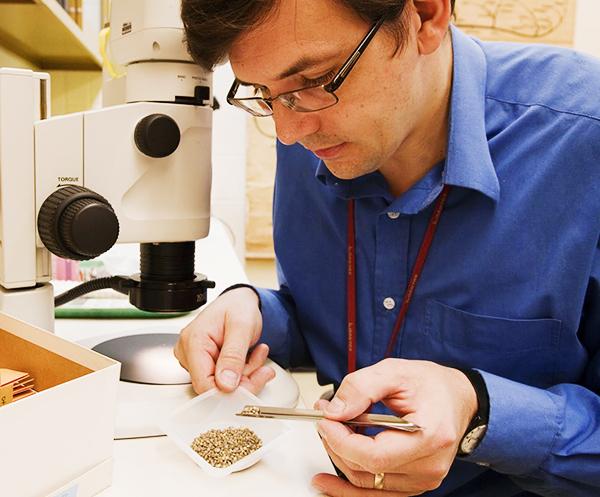Students, faculty and community members filed into Jamrich 1100 last Thursday night to see the NMU chapter of Scientific Research Society Sigma Xi’s distinguished lecture “The Cannabis Conundrum.” Though Sigma Xi is most well-known for sponsoring the Science on Tap series at the Ore Dock Brewing Company, once a year the group brings a speaker from outside of the community to talk to students away from the bar setting.
This year, the speaker chosen to present was botanist George Weiblen, Interim Scientific Director and Curator of Plants at the Bell Museum of Natural History located on the campus of the University of Minnesota.
Weiblen’s presentation, titled “Genetics and Politics of America’s Most Controversial Plant,” dove into the complexities faced when taking a scientific approach in studying properties of cannabis and hemp that are legally classified as a schedule-one controlled substance at the same level of regulation as LSD and heroin.
“In 1970 the Controlled Substance Act basically took any part of the plant cannabis and outlawed it except for two things,” Weiblen said.
“Two things that actually had an economy that wasn’t a drug economy at the time: bird seed because these seeds are highly attractive to birds and seeds incapable of germination could be imported from other countries—and also fiber.”
The talk was broken into four parts. Weiblen first introduced the field of ethnobotany, which he defined as the study of relationships between plants and people.
“You might not know that the seed of the cannabis plant was a staple grain food crop in ancient China, competing with rice as a source of carbohydrates,” he said.
Weiblen used history and politics surrounding hemp and cannabis to contextualize where we are today legally and culturally in regard to the plant.
“Some of the founding fathers grew cannabis for fiber on their plantations, including George Washington and Thomas Jefferson,” Weiblen said. “I even found a place in Thomas Jefferson’s garden book—where he wrote what plants he was growing—a quote where he says: ‘We may lay aside tobacco entirely, and the more of it we lay aside the happier I shall be.’
It’s vastly desirable to be getting underway with our domestic cultivation of hemp.’”
In the next part of his presentation, Weiblen spoke about the 15 years of research he has been doing at The University of Minnesota, focusing on the genetics of the cannabis plant that sets it apart from hemp plants. This topic transitioned into his study of ditch weed in Minnesota and the fact that hemp and marijuana are genetically different but defined in the same category.
“What my lab has been focused on is this genetic component and trying to understand genetically why it is that marijuana plants produce predominantly the THC molecule that’s got the euphoric effect most associated with it,” Weiblen said. “This compared while the hemp-type plants produce predominantly this other cannabinoid that’s been getting attention for its therapeutic effects that are not psychoactive but do have health effects.”
The last segment focused on the medical uses of hemp and cannabis. Sigma Xi was inspired to bring Weiblen due to the launch of the new medicinal plant chemistry major that is set to be offered for next year.
“There’s so much interest in this area it’s hard to keep up with at this point,” Weiblen said. “What I’ve been able to do is demonstrate how ridiculous it is for an American researcher to be productive in the current environment. By just playing by the rules it also serves a subversive purpose because it demonstrates to people like you who pay the taxes for all of this nonsense.”




























